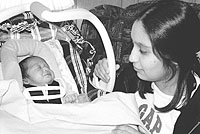Jacqueline Treviño-García said having her 6-year-old daughter and being married has been a blessing, and with the birth of her second daughter expected next month, she has even more for which to be thankful. Treviño-García, a graduate student in education, said at a very young age, her mother instilled in her the value of education. She, in turn, said she hopes to raise her own children, Alexis García and Aleeza García, who is expected to arrive March 19, with those same ideals.
Her mother worked a full-time job in the morning and a part-time job at night as a single parent, Treviño-García said. "(My mom) felt if I had an education and had a career, then my life wouldn't be so hard," she said. "That's why I haven't quit, and I keep going because I want the same thing for (my kids). "I know if we struggle for a little bit while I'm going to school, in the long run, my whole family will benefit." Treviño-García, who received her undergraduate degree from TCU as well, said she never drifted from her goal of an education. The summer after her high-school graduation in 1995, she enrolled at Tarrant County College to earn extra hours and the following fall, she began attending TCU. She said when she first came to TCU, it was a culture shock, and she was already different because she was married and had a baby. "Some people looked at me differently," she said. "They probably thought, 'Oh, it's just another Hispanic having a baby. But I had my friends here, and that's all that mattered." While she was an undergraduate student, Treviño-García participated in several extracurricular activities, including Golden Key National Honor Society, the political science and Spanish honor societies and Sigma Lambda Alpha, the Hispanic sorority. She said because of her family's help, she was able to devote part of her time to studying and participating in the usual college activities. "Before Alexis was going to school, my mother-in-law would take care of her during the day," she said. "When I needed to study or had to come for SLA meetings, my husband and mom would be there for me." It was a whole family effort, but sometimes not everything fell so neatly into place, she said. "I quickly relearned how to manage my time," Treviño-García said. "It took me a long time to figure out life at home and life at school. My time at school and in SLA is my own thing - my time to breathe."
"At one point, I was screaming and wished I could give up and quit, but I didn't. I couldn't." She said after having her daughter, she had even more motivation to finish her degree. "I want to be a role model for her and also be financially responsible," she said. "I want her to have everything and not be deprived." Treviño-García said the reason she is going into secondary education is so she can be a role model to other children in her same situation. Another student, Martha Cao, a junior accounting major, said she also shares the responsibility of raising her two children, 6-year-old Alyssa Rico and 4-week-old Jonathan Cao, with her husband, Bruce. This semester, Cao said she decided to take a three-hour Internet course, Survey of Theater, because she was expecting Jonathan, who was born Feb. 1 and would not have the time to take a full load. She said that because of difficulties in Jonathan's birth, she had to have a Ceasarean section and began to fall behind in her course. "I couldn't walk or drive or even get out of bed," she said. "I e-mailed my professor (George Brown) and told him the situation, and he was so understanding." Brown, an associate professor of theater, said the Internet course offered her a high flexibility that she needed during her pregnancy. "Here she is, a woman with a newborn baby and the complications of pregnancy - a traditional class would never have allowed her the flexibility," he said. Cao said professors in the past have also been supportive of her situation. "Last semester, Alyssa would have field trips, and the teachers would invite the mothers to volunteer," she said. "I told my marketing professor I wanted to go, and he was real supportive." Cao had Alyssa when she was a sophomore in high school and started college immediately after her graduation. Without her parents, Cao said she doesn't know what she would have done. She said at the beginning, all her classes and studying were done between 8 a.m. and noon, during which time her father would look after Alyssa. Immediately after class, she would go home so her dad could go to work. "I had to use my time wisely," she said. "I had to focus on school, instead of going to the Student Center and hanging out." She said her family encouraged her to join a sorority, and in Fall 1996, she pledged SLA. Cao said she has no regrets, and if given the chance, she would not change any part of her life. Both Cao and Treviño-García said it would be helpful if TCU provided a day care on campus.
Edd Bivin, vice chancellor for administrative services, said TCU needs to look at the idea of a day care for its employees and students. The Mary I. Gourley Scholarship Foundation helped Treviño-García with financial aid. Jean Day, the administrative assistant for MIG, said the foundation offers scholarships to mature adults who want to go back to school and wouldn't be able to do so otherwise. "We don't specify if the money is for books or tuition," she said. "We set a certain amount of money for the school, and the director gives the students the checks. And they can use it for anything - child-care, rent." Day said her organization helps a large range of people, from international students to single and married men and women with children. Treviño-García said the MIG representatives were helpful. "They sent me $500 every month, and I could use that on my account or to pay bills at home," she said. "When I graduated, they sent me graduation money and encouraging letters." Treviño-García said she is thankful for the help that she has received along the way. "We always thank God because he made sure we always had enough money to live," she said. The Counseling Center offers help and guidance to single or married parents at TCU. John Schuster, a clinical psychologist at the Counseling Center, said about one or two parents a semester come to him for counseling. "There are maybe two groups of (parents)," he said. "The first group, and this applies to everybody, are people who just need some support to get through a hard time. They don't really need a change. They just need to talk. "The second, you can tell that they have to do something differently. Maybe drop back on a class or two or work less or find somebody to help take care of their kids." Schuster said it is normally a matter of getting parents to accept the fact that they have to cut back their time and not feel guilty about being unable to be a full-time student. He said it's better to take less classes than to force it all into four years and be miserable. "It's OK to stretch it out," he said. "It doesn't mean you won't get your degree." Treviño-García, who finished her undergraduate degree in 4 1/2 years, said she has high hopes for the years to come. "I think it's time that my family is going to reap the benefits of my education," she said. "We've struggled, and now it's time to live a good life. With the new baby and finishing my master's degree in December, we can only go up."
Kathryn Garcia |
| The TCU Daily Skiff © 1998, 1999 Credits |
 "(My mom) always felt like she wasn't good enough because
she didn't have an education," Treviño-García said.
"She always told us to go on, that education was important."
"(My mom) always felt like she wasn't good enough because
she didn't have an education," Treviño-García said.
"She always told us to go on, that education was important." However, Treviño-García said there were struggles
along the way.
However, Treviño-García said there were struggles
along the way. "With my son, it would be a lot of
help to have some place where I could drop him off before class and pick
him up right afterward," Cao said.
"With my son, it would be a lot of
help to have some place where I could drop him off before class and pick
him up right afterward," Cao said.